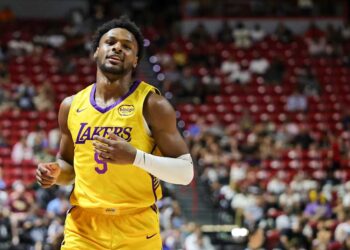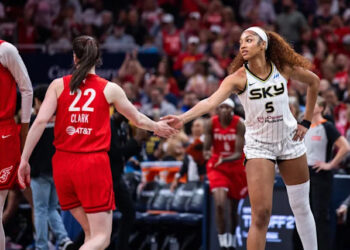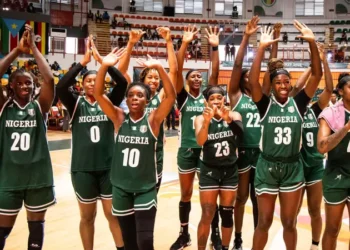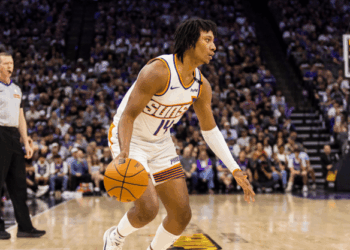In a development that has sparked speculation across the NBA, veteran guard Russell Westbrook has declined his $3.5 million player option for the 2025–26 season with the Denver Nuggets. The 35-year-old former MVP is set to become an unrestricted free agent, opening the door to what could be a pivotal final act in one of the most dynamic careers in basketball history.
Westbrook’s Decision: Business and Legacy
While the $3.5 million option was relatively modest for a player of Westbrook’s stature, the decision to forgo it suggests that he is seeking either a more significant role, a more competitive financial package, or perhaps both. Having accepted a bench role in Denver, Westbrook provided energy and leadership, but his playing time and offensive responsibilities were limited on a roster already stacked with stars like Nikola Jokić and Jamal Murray.
Westbrook’s choice could also be influenced by a desire to control his own destiny. The one-time triple-double king has seen his role and reputation fluctuate in recent years, bouncing between teams like the Rockets, Wizards, Lakers, and Clippers before landing in Denver. Opting out allows him to test the market and evaluate opportunities where he might contribute in a more prominent or meaningful way — perhaps even as a veteran leader on a team with championship aspirations.
Nuggets’ Perspective: Respect and Transition
From the Denver Nuggets’ perspective, Westbrook’s departure isn’t entirely unexpected. The team brought him in on a short-term deal, largely as a low-risk veteran addition to strengthen their bench depth and provide a spark during the grind of the regular season. He averaged 7.8 points, 4.3 rebounds, and 3.6 assists per game — solid contributions in limited minutes.
Denver now has some flexibility to continue evolving its roster around its championship core. Westbrook’s departure frees up a roster spot and some cap space, albeit modest, that the front office can use to either bring in younger talent or add another veteran who fits better into head coach Michael Malone’s system.
Where Could Westbrook Go Next?
Now that he’s a free agent, the question becomes: what does Westbrook want next in his career?
He could be eyeing a team that needs veteran leadership in the locker room and on the floor. A few potential destinations stand out:
Miami Heat: Known for embracing gritty veterans, the Heat could benefit from Westbrook’s energy, especially with Kyle Lowry aging and their offensive flow occasionally stalling in key moments.
Chicago Bulls: With Lonzo Ball’s return uncertain, Chicago could look to Westbrook as a short-term solution who can inject pace and aggression into their backcourt.
Los Angeles Clippers (again): If the Clippers don’t re-sign James Harden or want more backcourt stability, Westbrook could return to a familiar environment where he had moments of success.
San Antonio Spurs: Though not immediate title contenders, the Spurs may see Westbrook as a mentor to phenom Victor Wembanyama while adding excitement and guidance to their youthful roster.
It’s unlikely that Westbrook will command a large contract, but there is always room in the NBA for experienced, passionate players who can elevate teammates and bring edge to the locker room.
A Career at a Crossroads
Russell Westbrook’s NBA journey is unlike any other. A nine-time All-Star, two-time scoring champion, and the league’s MVP in 2017, Westbrook redefined the modern triple-double and played every game with unmatched intensity. But the last few seasons have seen his role diminish, his shooting woes scrutinized, and his turnovers questioned. The challenge now is finding a team and system that can utilize his strengths while minimizing his liabilities.
This offseason may determine whether Westbrook becomes a meaningful contributor on a contender, a mentor on a rebuilding squad, or fades quietly into the final chapters of his career. But don’t count him out just yet. If there’s one constant with Russell Westbrook, it’s his relentless will to compete.
The Bigger Picture
Westbrook’s opt-out is a minor financial move in terms of cap impact, but symbolically, it speaks to the broader theme of NBA veterans redefining their legacies in the latter stages of their careers. Like Carmelo Anthony and Derrick Rose before him, Westbrook may be shifting toward a phase where contribution is measured not in stats, but in leadership, impact, and adaptability.
No matter where he lands next, Russell Westbrook remains one of the most compelling figures in the NBA — a reminder of how fierce individuality and explosive athleticism can coexist in one player. His story isn’t over yet, and the next chapter could be just as dramatic a
s the ones that made him a household name.











